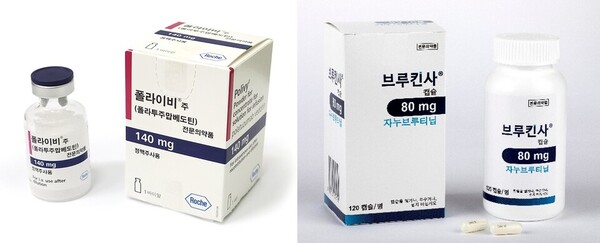As drugs demonstrating superior efficacy over existing standard treatments for blood cancers repeatedly failed to get insurance benefits, patients have come forth to call for their swift reimbursement.
The Korea Alliance of Patients Organizations delivered an opinion letter to the Health Insurance Review and Assessment Service (HIRA) last Tuesday, requesting that Roche's Polivy (polatuzumab vedotin) and BeiGene’s Brukinsa (zanubrutinib) be tabled on the Cancer Disease Review Committee (CDRC) and reviewed whether it is appropriate to reimburse them.

Polivy is the first antibody-drug conjugate (ADC) targeting CD79b and was first approved by the Ministry of Food and Drug Safety (MFDS) in October 2020 for treating relapsed or refractory diffuse large B-cell lymphoma (DLBCL), with an expanded indication for first-line treatment of DLBCL in November 2022.
Roche initially filed for reimbursement for the approved indication to treat relapsed or refractory DLBCL but lost its initial reimbursement challenge in 2021. It has now applied for reimbursing the recently expanded first-line indication. Polivy’s application for new coverage, filed in June, is waiting to be tabled on the CDRC.
Polivy is the first agent to demonstrate a significant progression-free survival (PFS) improvement over the rituximab plus cyclophosphamide, doxorubicin, vincristine, and prednisone (R-CHOP) combination, which has been the standard of care for first-line DLBCL for the past 20 years.
In combination with rituximab plus cyclophosphamide, doxorubicin, and prednisone (R-CHP), Polivy reduced the risk of disease progression or death by 24 percent compared to conventional R-CHOP.
Typically, four out of 10 patients who receive R-CHOP as a first-line treatment for DLBCL do not respond to treatment or experience a relapse. As with other blood cancers, DLBCL is associated with a poor prognosis and significantly increased healthcare costs with each additional line of treatment, so there was an urgent need to develop more effective therapies for first-line treatment.
The POLARIX study, a phase 3 clinical trial, demonstrated the superiority of the P-R-CHP regimen in improving PFS compared to R-CHOP, making it the highest level of recommendation (category 1A) recommended by global guidelines such as the National Comprehensive Cancer Network (NCCN).
Brukinsa, a second-generation BTK inhibitor that targets Bruton’s tyrosine kinase (BTK), was first approved by the Ministry of Food and Drug Safety in February 2022 to treat mantle cell lymphoma (MCL) and Waldenstrom macroglobulinemia (WM). The indications have since been expanded to include marginal zone lymphoma (MZL) and chronic lymphocytic leukemia/small lymphocytic lymphoma (CLL/SLL).
BeiGene applied for reimbursement at the same time as Brukinsa’s approval from MFDS and passed the cancer review in about 40 days (April 2022). However, only WM is now on reimbursement. For the MCL indication, BeiGene applied for reimbursement again but could not cross the threshold of CDRC in both attempts.
BeiGene recently challenged the expanded coverage for the MCL and CLL/SLL indications, and those challenges are also pending. For the MCL indication, it's a third attempt.
The current NCCN guidelines recommend Imbruvica (ibrutinib) monotherapy and Imbruvica plus rituximab in combination as other recommended regimens in the second-line treatment of MCL, with Brukinsa monotherapy as the preferred regimen.
Second-generation BTK inhibitors have demonstrated superior response rates to first-generation agents in treating second-line MCL.
In addition, Lilly's Jaypirca (pirtobrutinib) was approved in the U.S. earlier this year to treat relapsed or refractory MCL, bringing the number of third-generation agents to three. However, only Imbruvica is still covered by insurance in Korea.

